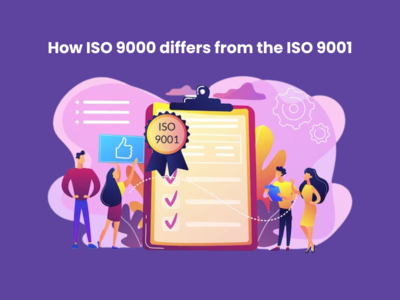The standards of quality management might seem to be a maze of rules and terminology. ISO 9000 and ISO 9001 are two of the terms that are most often used in this field. It is essential for all individuals aiming to guarantee excellence and uniformity in their company’s activities to understand their differences and their connection to ISO quality standards.
In this blog, we will look at the differences between ISO 9000 and ISO 9001, the importance of ISO 9001 Training Courses, and the roles ISO 9000 and ISO 9001 play in ISO Quality Standards.
Table of Contents
- ISO 9000: The Foundation of Quality
- ISO 9001: The Certified Quality Management System
- Key Differences between ISO 9000 and ISO 9001
- Certification vs. Guidance
- Focus on Quality Management System
- Applicability and Certification
- Process Documentation
- Customer Focus
- ISO 9001 Training Courses: Enhancing Your Knowledge
- Continuous Learning for Excellence
- Sustainable Quality Management Practices
- Conclusion
ISO 9000: The Foundation of Quality
It is important to understand the significance of ISO 9000 as the cornerstone of the ISO quality standards framework before diving into the details of ISO 9001. ISO 9000 is not a certification, but rather a collection of international standards and recommendations for quality management and assurance. It offers the basic principles and terminology required to set up a quality control system.
ISO 9000 provides a framework and a standard language for businesses to understand and convey requirements and ideas related to quality. It covers various topics, such as continuous improvement, the process method, and quality management concepts.
ISO 9001: The Certified Quality Management System
On the other hand, ISO 9001 is a subset of the ISO 9000 family of standards. The conditions that a business must fulfil in order to get ISO 9001 certification are outlined in this standard. Fundamentally, ISO 9001 outlines the requirements that must be satisfied for a company to show that it can reliably provide goods and services that satisfy both legal and consumer demands.
Key Differences between ISO 9000 and ISO 9001
Now, let’s discuss some of the most significant distinctions between these two standards:
Certification vs. Guidance
ISO 9000 is a set of standards and recommendations for quality management; it is not a certification. Businesses don’t aim for ISO 9000 accreditation. On the other hand, ISO 9001 lays out the conditions that businesses must fulfil to get certified.
Focus on Quality Management System
With its emphasis on the foundations of a quality management system, ISO 9000 provides a comprehensive overview of concepts and terminology. As a certification standard, ISO 9001 explores the particular criteria that a business must fulfil to create and maintain a quality management system.
Applicability and Certification
Any business, regardless of size or sector, may implement ISO 9000. It is an invaluable tool for understanding the fundamentals of quality management. On the other hand, firms looking to certify their quality management system may use ISO 9001. Many sectors now demand ISO 9001 certification, which may make a big difference in the marketplace.
Process Documentation
Although ISO 9000 offers guidance on process documentation, it is silent on the minimum degree of documentation needed. On the other hand, ISO 9001 specifies in great detail how records, processes, and procedures must be documented within the quality management system.
Customer Focus
ISO 9001 and ISO 9000 place equal emphasis on customer satisfaction and concentration. To go one step further, ISO 9001 requires businesses to actively manage customer-related operations, define and assess customer satisfaction, and establish improvement objectives.
ISO 9001 Training Courses: Enhancing Your Knowledge
Anyone hoping to develop a strong quality management system or get ISO 9001 certification must understand the distinctions between ISO 9000 and ISO 9001. Businesses often use ISO 9001 training courses to provide their staff with the information and abilities they need. These courses assist professionals in completing the certification process by covering the specifics of ISO 9001.
Continuous Learning for Excellence
Continuous learning and adaptability are critical to quality management. Obtaining and maintaining ISO 9001 certification is the first step toward continuous improvement, not the end goal. Establishing a culture of continuous improvement and adhering to industry best practices and the growing ISO quality standards are important for organisations. Their unwavering dedication to acquiring knowledge guarantees their position at the forefront of quality management and their ability to provide customers with excellent goods and services.
Sustainable Quality Management Practices
It is essential for firms to prioritise sustainability in quality management techniques. Sustainability is related to both the long-term health of an organisation’s quality management system and environmental issues. This requires being flexible, making sure all parties are involved, and maintaining a long-lasting dedication to excellence and client pleasure. Over time, your company can flourish by including sustainability ideas in your quality management system.
Conclusion
In summary, ISO 9001 and ISO 9000 are different but connected parts of the ISO quality standards system. While ISO 9001 establishes the conditions for certification, ISO 9000 provide the basic ideas and terminology for quality management. Organisations can satisfy consumer expectations, remain competitive in the market, and align their quality management procedures with industry best practices by understanding the distinctions between these standards.




